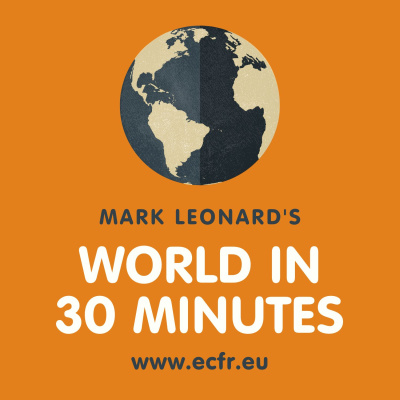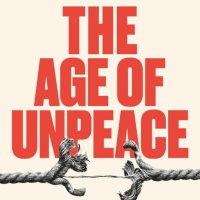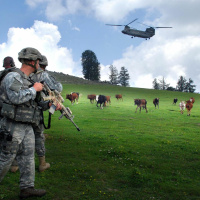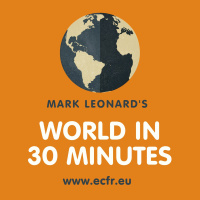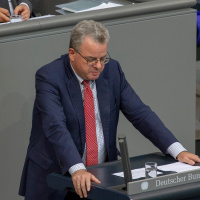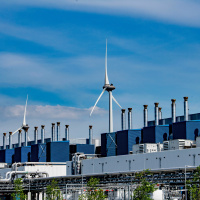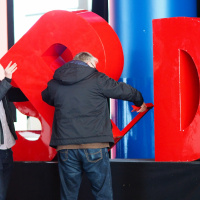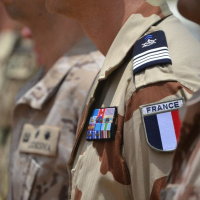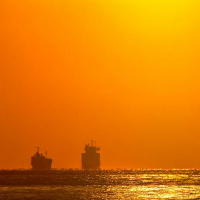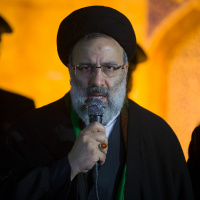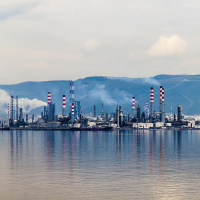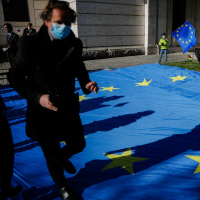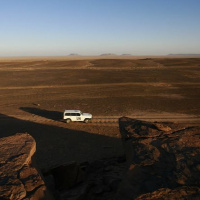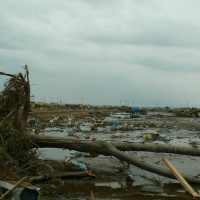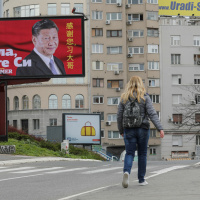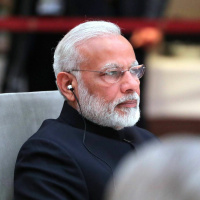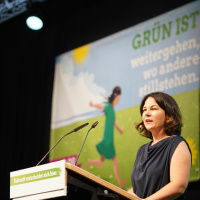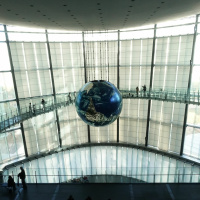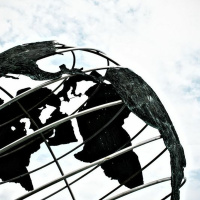Synopsis
Foreign policy podcasts hosted by Mark Leonard, Director of the European Council on Foreign Relations (ECFR), the first pan-European think-tank.
Episodes
-
The Age of Unpeace
17/09/2021 Duration: 29minIn his newly released book “The Age of Unpeace: How Connectivity causes Conflict” ECFR director Mark Leonard explains how many of the forces that we thought would bring us together have ended up driving us apart. Trade, technology, the internet, and travel were once promised to create a global village but have instead created an era of “unpeace”, where the distinctions between war and peace are breaking down.In this week’s episode, Mark Leonard becomes the guest of his own podcast to talk with ECFR’s Asia programme director Janka Oertel about the main themes of his book and particularly how China’s growing role in this interconnected world poses threats for Europe.This podcast was recorded on 16 September 2021.Further reading:Age of Unpeace by Mark Leonard“The Afghan tragedy and the age of unpeace” by Mark LeonardBookshelf:“Doom” by Neil Ferguson“Shutdown. How Covid Shook the World’s Economy” by Adam ToozeMove by Parag Khanna“Renewal: From crisis to transformation in our lives, work, and politics” by Anne Mar
-
The fall of the Afghan government and what it means for Europe
10/09/2021 Duration: 35minThe collapse of Afghan government forces and the rapid seizure of power by the Taliban has unleashed a series of intense debates about the implications for Europe. How will the Western withdrawal impact on the state of European defence and military capabilities? Are we likely to see a shift in Europe’s relationship with other powers - such as Turkey, China, and the United States? In this week’s podcast, host Mark Leonard talks with Jeremy Shapiro, ECFR’s research director, and senior policy fellows Asli Aydintaşbaş and Andrew Small about what the withdrawal of Western forces from Afghanistan means for Europe and the future of transatlantic relations.This podcast was recorded on 8 September 2021.Further Reading:- “The fall of the Afghan government and what it means for Europe” by ECFR policy experts: https://buff.ly/3kqkOjh - “The Afghan tragedy and the age of unpeace” by Mark Leonard: https://buff.ly/3gXZTmSBookshelf:"Age of Unpeace" by Mark Leonardhttps://www.penguin.co.uk/books/144/1443237/the-age-of-unpea
-
Introducing Mark Leonard's World in 30 Minutes | Trailer
06/09/2021 Duration: 01minEvery Friday, Mark Leonard invites top-level speakers from across the EU and beyond to debate Europe’s role in the world. We feature and discuss everything from our own research at ECFR to practical pan-European policy – and news from Africa, Asia, Middle East and North Africa, Wider Europe and our own European Power programme. So basically, we bring you the world – in 30 minutes. Hosted on Acast. See acast.com/privacy for more information.
-
CDU foreign policy post-Merkel
03/09/2021 Duration: 37minWith Germany’s federal elections rapidly approaching, chancellor Angela Merkel is set to depart the political stage. What will the foreign policy of her party, the CDU, look like when she’s gone? In this week’s podcast, host Mark Leonard talks to ECFR senior policy fellow Ulrike Franke and Andreas Nick, a CDU member of the German Bundestag. How would a chancellor Armin Laschet approach China, Russia, and defence? And what exactly sets the CDU’s foreign policy apart from those of the Social Democrats or the Greens? This podcast was recorded on 1 September 2021.Further Reading: ECFR German Election 360https://ecfr.eu/topic/german-election-2021/ Bookshelf: “Age of Unpeace: How Connectivity Causes Conflict” by Mark Leonard https://www.penguin.co.uk/books/144/1443237/the-age-of-unpeace/9781787634657.html “Has China Won?” by Kishore Mahbubani https://www.publicaffairsbooks.com/titles/kishore-mahbubani/has-china-won/9781541768123/ “From Cold War to Hot Peace” by Michael McFaul https://fsi.stanford.edu/content/cold-w
-
Kyiv’s relations with Europe in the age of Nord Stream 2
30/07/2021 Duration: 35minUkraine and the EU recently opened a new chapter in their strategic relationship by signing a memorandum of understanding for closer cooperation in raw materials, green and digital technologies. Making Ukraine part of the European value chain is of strategic importance, but where does the country stand on the recent US-German deal on Nord Stream 2? In this week’s episode, guest host Joanna Hosa, deputy director of ECFR’s Wider Europe programme talks with Svitlana Zalishchuk, Deputy Prime-Minister Foreign Policy Advisor and former Member of Parliament in Ukraine and ECFR senior policy fellow Andrew Wilson about Ukraine, its domestic and international outlook and what the EU can and should do to support Ukrainian sovereignty. This podcast was recorded on 29 July 2021. Further reading: “Faltering fightback: Zelensky’s piecemeal campaign against Ukraine’s oligarchs” by Andrew Wilson https://ecfr.eu/publication/faltering-fightback-zelenskys-piecemeal-campaign-against-ukraines-oligarchs/ Bookshelf: “Civilisations
-
The geopolitics of technology
23/07/2021 Duration: 36minThe EU is often described as a “regulatory superpower” benefitting from the so-called “Brussels effect.” But is the bloc also able to set its own rules and standards when it comes to new technologies, and let the rest of the world adapt? This week, host Mark Leonard is joined by ECFR senior policy fellows Ulrike Franke and Jose Torreblanca, as well as Marietje Schaake, international director of policy at Stanford’s Cyber Policy Center. How ready are Europeans to prevail in a world of fierce geopolitical tech competition? And what role does Europe play in the Sino American competition?This podcast was recorded on 16 July 2021.Further reading:· “Geo-tech politics: Why technology shapes European power” by Ulrike Franke & José Ignacio Torreblanca https://ecfr.eu/publication/geo-tech-politics-why-technology-shapes-european-power/· “Europe’s digital sovereignty: From rulemaker to superpower in the age of US-China rivalry” by Carla Hobbs (ed.) https://ecfr.eu/publication/europe_digital_sovereignty_rulemaker_supe
-
A social democratic vision of German foreign policy
16/07/2021 Duration: 35minWith Angela Merkel stepping down as Chancellor, the next German federal elections scheduled for this September promise to mark a turning point for Germany. Foreign policy issues promise to be a crucial part of the election campaign. In this week’s podcast, host Mark Leonard talks to Niels Annen, Minister of State in the German Federal Foreign Office and member of the Bundestag for the SPD to find out what a social-democratic foreign policy looks like. What would SPD foreign policy look like unbound by the grand coalition with Merkel’s Christian Democrats? What are social democratic policy ideas when it comes to China, Russia or European security and defence? And how deep are the divides between the SPD’s foreign policy and that of the parties they’re running against?This podcast was recorded on 15 July 2021.Further Reading:- ECFR German Election 360: https://buff.ly/3gJNvr2- A foreign policy for a Green Germany: https://buff.ly/3vxdTcd Bookshelf:- “The Arab of the Future” by Riad Sattouf Hosted on Acast. Se
-
The EU and France in the Sahel
09/07/2021 Duration: 35minIn June this year, French President Emmanuel Macron announced the end of Operation Barkhane – a military offensive launched in 2013 against Islamist militants in the Sahel. France has determined, he said, it could no longer maintain a “constant presence” in West Africa. In this week’s episode, host Mark Leonard discusses European interests in the region and what might change after France’s Africa policy shift, together with Emanuela Del Re, former Italian deputy foreign minister and the new EU special representative for the Sahel; Sylvie Kauffmann, editorial director, lead writer, and columnist for Le Monde; as well as ECFR’s Andrew Lebovich. What does the end of Operation Barkhane in its current form mean for the Sahel? What could further European and international engagement in the region look like?This podcast was recorded on 7 July 2021.Further reading:• “After Barkhane: What France’s military drawdown means for the Sahel” by Andrew Lebovich: https://t.co/xxZ11TiM24 Bookshelf• ”La Guerre de vingt ans. Dji
-
The strike back against economic blackmail
02/07/2021 Duration: 29minGlobalisation and economic interdependence are increasingly weaponised by various state actors. Europe faces ever greater threats of economic blackmail, sanctions against its lawmakers, and consumer boycotts of its companies. Later this year, the European Commission will launch the Anti-Coercion Instrument, a tool that could enable the EU to protect citizens and businesses by countering economic blackmail from China, Russia, and Turkey – and even the US. In what circumstances could such a tool be triggered? What kind of countermeasures could protect Europe, keep markets open and support a functional global trade order? And how can such a tool be both credible and effective? To find out, host Mark Leonard talks to policy fellows Jonathan Hackenbroich and Pawel Zerka, who worked with the ECFR Task Force for Protecting Europe from Economic Coercion on our latest publication: https://buff.ly/3zTgkZo This podcast was recorded on 1 July 2021. Further Reading:"Xi, Merkel phone call ‘timely to stabilise ties’" in Glo
-
The election of President Ebrahim Raisi and the future of Iran
25/06/2021 Duration: 34minAfter an election which saw the lowest turnout and highest number of spoiled ballots in the history of the Islamic Republic, the ultraconservative regime veteran Ebrahim Raisi was elected as the newest president of Iran. Does the election of Raisi represent a significant change of direction following the term of President Rouhani? Could unified hardliner control of Iran paradoxically lead to a more durable nuclear deal and greater dialogue with regional adversaries such as Saudi Arabia? Will Raisi’s own human rights record prove a barrier to talks with Western powers?To find out, this week’s host Anthony Dworkin, senior research fellow and acting research director at ECFR, talks to Narges Bajoghli, assistant professor of Middle East Studies at the School of Advanced International Studies (SAIS) at Johns Hopkins University, Esfandyar Batmanghelidj, founder and CEO of the Bourse & Bazaar Foundation and visiting fellow at ECFR, and Julien Barnes-Dacey, director of ECFR´s MENA programme.This podcast was recor
-
New Energies: The European Green Deal and the EU-Turkey relationship
18/06/2021 Duration: 29minThe meeting between US president Biden and the Turkish president Erdogan, as well as the upcoming European Council Summit on Turkey come at a critical moment in the EU-US-Turkey relationship. After years of heightened tensions, there appears to have been a thawing in relations since the beginning of this year. The renewed focus on climate policy by the EU, however, makes many aspects of this relationship uncertain. Are carbon border taxes a threat to Turkish trade? How can Turkey and the EU cooperate on green energy? To find out, host Susi Dennison, director of ECFR´s European Power programme, talks to Asli Aydıntaşbaş, senior policy fellow at ECFR and in-house expert on Turkey, and Simone Tagliapietra, senior fellow at Bruegel focusing on European Union climate and energy policy. They discuss the outcomes of the Biden-Erdogan summit and the prospects for the EU-Turkey relationship, particularly in relation to the EU’s climate policies.This podcast was recorded on 17 June 2021.Further Reading:- "Europe’s Gree
-
What future for the transatlantic alliance?
11/06/2021 Duration: 31minJoe Biden described his mission for his trip to Europe this week as “realizing America’s renewed commitment to (its) allies and partners.” But what does this mean in practice? How well does the transatlantic alliance still fit with the way that Europe and the United States now see their goals in foreign policy? To find out, host Anthony Dworkin, senior policy fellow at ECFR, talks to Susi Dennison, director of ECFR´s European Power Program, Jana Puglierin, head of ECFR´s Berlin office, as well as Jeremy Shapiro, ECFR´s research director. They discuss what Europe and the US want from this week’s summit meetings and look at some of the striking results of ECFR’s latest public opinion poll across 12 European countries. Once the coronavirus crisis is over, how do Europeans see the EU’s role in the world? This podcast was recorded on 9 June 2021.Further reading: - Crisis of confidence: How Europeans see their place in the world by Jana Puglierin & Susi Dennison: https://buff.ly/2RxZFt9 Bookshelf: - "How to p
-
Understanding the conflict in Western Sahara
04/06/2021 Duration: 31minThe little-known but long-running conflict in Western Sahara made it into the headlines in Europe recently, when Morocco weaponised migration in Ceuta to advance its territorial claim. Listen as host Julien Barnes-Dacey, director of the MENA programme at ECFR discusses the issue with Irene Fernandez-Molina, senior lecturer in International Relations at the University of Exeter and expert on frozen conflicts, Jose Ignacio Torreblanca, senior policy fellow and head of ECFR´s Madrid office, as well as Jacob Mundy, visiting fellow at ECFR and an associate professor in Peace and Conflict Studies and Middle Eastern, and Islamic Studies programs at Colgate University in Hamilton, New York. Together they try to find out what the Western Sahara conflict is all about, and how the most recent developments between Morocco and Spain will influence this conflict.Picture: UN Photo/Martine Perret (CC BY-NC-ND) Hosted on Acast. See acast.com/privacy for more information.
-
How the EU should respond to Belarus
28/05/2021 Duration: 28minLast Sunday, Belarus intercepted and diverted a commercial flight between two EU capitals to arrest a dissident. This, alongside the stagnation of the Belarusian economy, the continuing protests and Lukashenka’s illegitimate rule, fuels popular discontent in the country and worries the European Union. Katia Glod, non-resident fellow with the Russia programme of the US-based Center for European Policy Analysis, Linas Linkevičius, Former Minister of Foreign Affairs and former Minister of Defence of Lithuania as well as ECFR Council member, and ECFR visiting fellow Pavel Slunkin who previously worked for the Foreign Ministry of Belarus and our host for this week’s episode ECFR deputy director Vessela Tcherneva recap the recent developments and explore the broader context of the crisis: What will be the impact of the EU and US measures against Belarus? What is Russia’s role in this? And what should be next steps also ahead of the EU-US summit on 15 June? This podcast was recorded on 27 May 2021. Further reading:
-
The politics of catastrophe with Niall Ferguson
21/05/2021 Duration: 29minCatastrophe and disaster have been a frequent phenomenon throughout the history of mankind, coming in different forms. So how is it then that, despite being far more scientifically educated on the origins of disasters, we do not seem to be getting any better at dealing with them? To find out, host Mark Leonard talks to Niall Ferguson, author of the book “Doom: The politics of catastrophe” and senior fellow at both the Hoover Institution at Stanford University as well as the Center for European Studies at Harvard University. Together, they address why some societies and states respond to catastrophe so much better than others. And why do some fall apart, most hold together, and a few emerge stronger?This podcast was recorded on 16 May 2021.Further reading:- "Doom: The politics of catastrophe" by Niall Ferguson: https://buff.ly/3fy2DWA Bookshelf:- "America in the world: A history of U.S. diplomacy and foreign policy" by Robert B. Zoellick- "The road less traveled: The secret battle to end the Great War, 1916-19
-
China’s strategic approach to the Western Balkans
14/05/2021 Duration: 30minChina’s formalised, seemingly nonchalant, attitude towards the Western Balkans masks a surprising nimbleness and strategic intent. In the past decade, the country has become the most prominent third actor in this part of the European Union’s neighbourhood. To find out why, host Mark Leonard talks to Majda Ruge, senior policy fellow in ECFR´s Wider Europe programme with a focus on the Western Balkans, Vladimir Shopov, visiting fellow with ECFR´s Asia programme, as well as Vessela Tcherneva, deputy director of ECFR and head of ECFR’s Sofia office. Together, they discuss why it is important to take a closer look at Chinese engagement in the region, how much influence China already has in the Western Balkans and how European policymakers should react. This podcast was recorded on 12 May 2021. Further reading: Decade of patience: How China became a power in the Western Balkans by Vladimir Shopov, https://ecfr.eu/publication/decade-of-patience-how-china-became-a-power-in-the-western-balkans/ Bookshelf: Wa
-
The prospects for EU-India relations ahead of the Leaders Summit
07/05/2021 Duration: 27minThe EU is India's largest trading partner; India, in turn, is only the EU’s tenth largest trading partner. And despite the two often having expressed an interest in closer trade and political relations, there has been no visible progress made in the last years. Ahead of the EU-India Leaders Summit on 8 May 2021, host Mark Leonard talks to Fréderic Grare, senior policy fellow with ECFR’s Asia Programme, Raja Mohan, director of the Institute of South Asian Studies at the National University of Singapore and columnist of the Indian Express, as well as Manisha Reuter, ECFR´s Asia programme coordinator. How does the covid-19 pandemic impact India´s geopolitics and foreign policy? How has the rise of China influenced EU-India relations so far? And what are the prospects of a closer EU-India relationship following the upcoming Summit? This podcast was recorded on 5 May 2021. Further reading: “The EU’s Indo-Pacific strategy: A chance for a clear message to China and Europe’s allies” by Fréderic Grare: https://buff.l
-
A foreign policy for a Green Germany
30/04/2021 Duration: 24minWhile Germany’s long-ruling centre-right parties continue to offer more of the same, the Greens have recently emerged as a serious contender in the run-up to September’s federal elections. Rather than demanding that Germans give up their lifestyles, the Greens are promising to make Germany a better version of itself. But how will this affect German foreign policy? Host Mark Leonard talks to Franziska Brantner, spokesperson for European Policy and Parliamentary Secretary of Bündnis90/Die Grünen’s parliamentary group as well as Janka Oertel, head of ECFR´s Asia programme to discuss what Germany’s future with a Green government would look like. This podcast was recorded on 29 April 2021.Further reading: •“Germany’s Green Velvet Revolution?” by Mark Leonard: https://buff.ly/2RcOTb6 Bookshelf:•“Green Recovery Tracker": https://www.greenrecoverytracker.org/ •“Heimat Europa?” by Martin Ramb & Holger Zaborowski, • “China’s FinTech: the end of the wild west” by Viviana Zhu Hosted on Acast. See acast.com/privacy f
-
Towards stability: A new concert of powers
23/04/2021 Duration: 34minOur system is not fit to deal with the challenges of the 21st century. This has been laid bare not just by the covid-19 pandemic, but also by the increasing power competition between the US and China, and the blockage and weaponisation of the multilateral system and the current crisis of democracy. Could a new “concert of powers” possibly be the solution? This week, host Mark Leonard talks to Charles Kupchan, senior fellow at the Council on Foreign Relations (CFR) and professor of international affairs at Georgetown University; Leslie Vinjamuri, Director of the US and the Americas programme and Dean of the Queen Elizabeth II Academy for Leadership in International Affairs at Chatham House; as well as Nicu Popescu, senior policy fellow and director of ECFR´s Wider Europe programme. In this episode, they discuss the idea of a “global concert of powers” to promote stability in a multipolar world. How would such a format be formed and who would be involved? And how does the future of the liberal order look after
-
Between war and order: What has shaped Europe’s geopolitics?
16/04/2021 Duration: 33minDiplomacy and war have both been part of human history, but neither are stagnant concepts. Different conceptions of the global order influence policy decisions daily, while the notions of war equally shape nation-states and our lives. To get a deeper understanding of how both ideas impact geopolitics, host Mark Leonard talks to Margaret MacMillan, professor of history at the University of Toronto and author of the book “War: How Conflict Shaped Us”, Robert Cooper, distinguished British and European diplomat and author of “The Ambassadors: Thinking about Diplomacy from Machiavelli to Modern Times” and Gideon Rachman, British journalist and chief foreign affairs columnist for the Financial Times. What are different models for thinking about global order? How do ideas about war shape what statesmen and -women do?This podcast was recorded on 14 April 2021.Bookshelf:• “The ambassadors: Thinking about diplomacy from Machiavelli to modern times ” by Robert Cooper• “War: How Conflict Shaped Us” by Margaret MacMillan•
